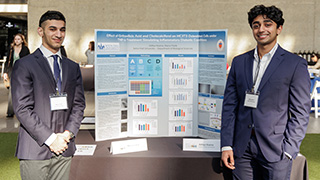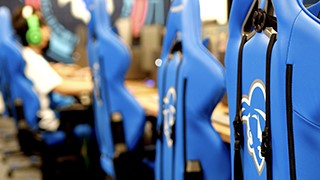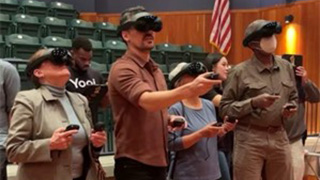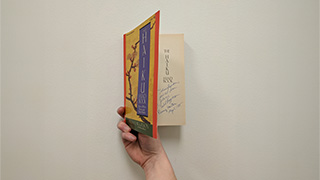Sports Poll Finds Fans Think Some Baseball Rules Are Ready for Change; 42 Percent 'More Excited' for this Year's Season
Friday, March 26th, 2021
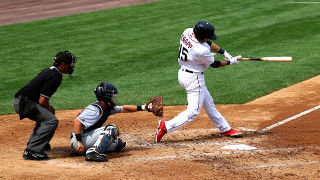
Some of the rule changes were implemented last year and will continue for the new season, some are on the table among 2022 proposals for MLB, and others are slated for further experimentation this year in the minor leagues.
Feelings about these rule changes were measured by a new Seton Hall Sports Poll, which
also showed that 27 percent of the general population is excited about the new baseball
season as compared to last year's Covid-shortened one. That excitement climbs to 42
percent among self-described sports fans and 58 percent among avid fans.
"Last year was an anomaly and we don't have enough asterisks to describe it," said
Seton Hall Marketing Professor and Poll Methodologist Daniel Ladik. "Covid interrupted
the age-old rhythm of the season – a season played before cardboard fans and spread
over 60 games. In some ways, the return of baseball is another harbinger of a return
to normalcy."
The Seton Hall Sports Poll was conducted March 13-15, geographically across the United States. The Poll had 1,538 adult respondents with a margin of error of +/- 3.2 percent. Apart from rule changes, there figures to be fans in the seats for the 2021 season, something that 43 percent of the general public and 61 percent of sports fans embraced in a question of whether, if vaccinated, they would attend outdoor events.
"Fans in the stands is a good start for MLB," said said Professor Charles Grantham, Director of the Center for Sport Management within the Stillman School of Business, which oversees the Seton Hall Sports Poll. "In-game revenue is something that was sorely missed in the 2020 season and even with social distancing in the stadiums the economic impact will be a net positive for the teams. And experimenting with rule changes can also have a positive impact on fan interest."
Rule Changes
During the shortened baseball season of 2020, Major League Baseball employed a number of rules changes, most of which will be subject to discussion for a new Collective Bargaining Agreement beginning in 2022. Some are on "hold" for 2021, including the National League adoption of the designated hitter rule. (A number of them will be tried in the minor leagues in 2021).
Looking forward to a post-pandemic sports world and faced with a number of these significant rule changes that grew from Covid adjustments from last year's baseball season, sports fans said they are prepared to either embrace new baseball rules or give greater consideration to them in a sport famous for its conservative reaction to change.
The six most significant changes that were polled include the National League adding the DH; seven inning games in all doubleheaders; expanding the post-season to 16 teams; extra innings starting with a runner on second; relief pitchers required to face at least three batters (unless an inning ends); and deadening baseballs to reduce home runs.
Adding the DH to the NL was something self-described sports fans who registered an opinion on the matter, agreed to by more than 2 to 1, with 42 percent agreeing and only 18 percent disagreeing with the DH-NL. Forty percent neither agree nor disagree or said they don't know or have no opinion. Among those considered "avid fans" the agree number rose to 57 percent, with only 17 percent disagreeing, and the remaining 26 percent neither agreeing nor disagreeing or having no opinion. Among the general population, 29 percent agreed; 14 percent disagreed, and 57 percent neither agreed nor disagreed or held no opinion.
"Given the generally conservative nature of fans when it comes to baseball, the high number of those who neither agreed nor disagreed was interesting, as though those fans could come to accept some of these changes if imposed," said Ladik. "There was a time when even the slightest change would be met with strong resistance."
As for making all doubleheaders seven-inning games (for both), that found agreement among 38 percent of sports fans (52 percent of avid fans) and disagreement among 27 percent of sports fans and 22 percent of avid fans. The general population agreed by a 26-20 percent margin, with 44 percent registering as "don't know/no opinion or neither agreeing nor disagreeing." This rule is in force for the 2021 season.
Expanding the post-season to 16 teams (as was done in 2020) was met with agreement by 37 percent of sports fans, with 24 percent disagreeing and 39 percent saying they neither agree nor disagree, or don't know/have no opinion. Among avid fans 50 percent agreed, 19 percent disagreed, and 31 percent neither agreed nor disagreed or said don't know/no opinion. Among the general population, 25 percent agreed, 19 percent disagreed, and 56 percent neither agreed nor disagreed or said don't know/no opinion. In 2021, there will still be only ten teams in the post-season.
Starting extra innings with a runner on second base was met by only 17 percent approval of the general population, 28 percent of sports fans and 41 percent of avid fans. Among those who disagreed were 33 percent of the general population, 40 percent of sports fans, and 34 percent of avid fans. Fifty percent of the general population neither agreed, disagreed, or had no opinion. This rule is in force for the 2021 season.
The practice of having relief pitchers face a minimum of three batters (unless ending an inning) found agreement among 44 percent of sports fans (58 percent of avid fans) and disagreement among 20 percent of sports fans and 18 percent of avid fans. The general population agreed by a 2 to1 margin (30-15), with 55 percent however neither agreeing nor disagreeing, or registering as "don't know/no opinion." The rule is in force for the 2021 season.
Deadening baseballs to reduce home runs found more resistance, with only 21 percent of sports fans agreeing (38 percent of avid fans) and disagreement among 44 percent of sports fans and 34 percent of avid fans. The general population disagreed by a 37-14 percent margin, with 50 percent registering as "don't know/no opinion" or neither agree nor disagree. This rule is in force for the 2021 season, but MLB does not expect it to impact the ball's performance, and is said to be intended to improve the consistency of baseballs in use.
Categories: Athletics, Nation and World

